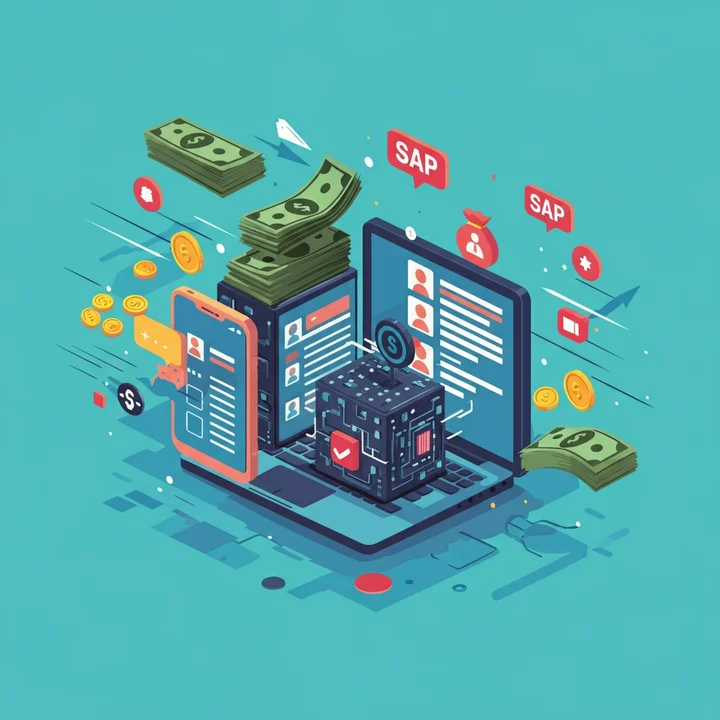The world of freelancing and online work promises unmatched freedom and flexibility—a truly appealing way to earn money online. However, consistently finding and retaining high-quality clients remains a significant challenge for many. Whether you're a talented designer, a compelling writer, an efficient virtual assistant, or an innovative software developer, your ability to secure steady work and cultivate long-term client relationships is the bedrock of a thriving freelance business.
This in-depth guide will reveal proven strategies to attract high-paying clients and transform one-time projects into lasting, profitable collaborations. You'll learn the best places to find opportunities, how to showcase your skills powerfully, and what it truly takes to keep clients coming back for more, ensuring consistent online income. By the time you finish reading, you'll have a clear roadmap to building a sustainable and highly rewarding freelance career.
Why Client Acquisition & Retention Are Non-Negotiable for Freelancers
The freelance world is undeniably competitive. With billions of freelancers globally, merely possessing technical skills isn't enough to stand out. Successfully finding clients requires proactive outreach and a meticulously crafted personal brand, while effectively retaining them ensures a consistent income stream and firmly establishes you as a trusted expert in your niche.
Building robust client relationships isn’t just about delivering excellent services; it's about demonstrating unwavering reliability, communicating with clarity and empathy, and consistently offering value that genuinely exceeds expectations. Consider this: a satisfied client is not only a repeat customer but also a potential source of referrals, which are often the best kind of leads. This leads to less time spent marketing and more time focused on actual work.
Are you prepared to establish a freelance business that is both truly successful and sustainable? Let's explore the exact steps to find and keep exceptional clients.
Step 1: Forge a Powerful Personal Brand
Why Your Brand Matters for Online Earning
Your personal brand is your unique calling card in the digital marketplace. That's what distinguishes you from the countless other freelancers offering similar services. A strong, cohesive personal brand effectively communicates your expertise, specialization, and professional identity, making an unforgettable first impression on potential clients looking for skilled professionals. It tells clients who you are, what you stand for, and what unique value you bring before they speak to you.
Here are key strategies to build a winning freelance brand:
Specialize Relentlessly: Instead of broadly marketing yourself as a "generalist," position yourself as an undeniable expert in a specific niche. For instance, rather than "web developer," become the go-to e-commerce web developer for Shopify startups or the SaaS content writer specializing in AI. This approach allows you to command premium rates because clients seek specific solutions, not general ones. When you specialize, you become the obvious choice for a particular need, making it easier for clients to find and trust you.
Create an Impeccable Portfolio Website: Your website is your digital storefront, accessible 24/7. Design a clean, user-friendly portfolio website that prominently showcases your best work. Don't just show lovely pictures; include compelling case studies that outline the client's problem, your solution, and the measurable results you achieved. Display glowing client testimonials prominently. Ensure there's a clear call to action (e.g., "Hire Me," "Request a Quote," "Schedule a Consultation") so potential clients can effortlessly connect with you and know exactly what to do next.
Optimize Professional Profiles: Ensure your profiles on major freelance platforms like Upwork and Fiverr, as well as professional networking sites like LinkedIn, are fully optimized. Use a professional, friendly headshot. Write compelling bios that clearly articulate your unique value proposition, highlighting your top skills and experience. Populate these profiles with keywords relevant to your niche so clients searching for specific services can easily find you. Think of these as extensions of your main portfolio, each tailored slightly for the platform's audience.
Example in Action: Imagine you're a freelance writer. Instead of just "writer," you brand yourself as "The Holistic Health Content Strategist." Your portfolio website would then specifically showcase SEO-optimized blog samples for meditation apps, successful email nurture sequences for wellness coaches, and case studies demonstrating increased organic traffic for holistic brands. This laser-focused approach immediately communicates your expertise to your ideal client.
Step 2: Strategically Find High-Quality Clients
Where to Discover Online Jobs and Freelance Opportunities:
Premier Freelance Platforms: Sites like Upwork and Fiverr are excellent starting points, especially for new freelancers looking to build a track record. They connect you with a global pool of clients and simplify the process of invoicing and receiving payments. For highly skilled professionals, exclusive networks like Toptal offer access to premium clients and high-value projects. These platforms offer built-in security for payments and dispute resolution, making them a safe entry point into earning money online.
Targeted Social Media Networking: Platforms like LinkedIn are invaluable for professional networking. Actively join industry-specific groups (e.g., "SaaS Marketing Professionals," "E-commerce Business Owners") and engage thoughtfully with posts. Share your own insights, answer questions, and participate in discussions to establish yourself as an authority. Social media can also be used to share snippets of your work and showcase your personality.
Specialized Job Boards: Beyond general job aggregators, look for niche-specific job boards. For example, We Work Remotely and Remote.co are dedicated to remote jobs across various industries. Writers can explore boards like the ProBlogger. These boards often feature listings specifically for remote or freelance roles, making your search more efficient.
Strategic Cold Pitching: Don't underestimate the power of direct outreach. Conduct research on companies that align perfectly with the services you offer. Pinpoint a particular challenge they may be facing that you are equipped to address. Then, craft a highly personalized email. Don't send a generic template; show that you've genuinely researched their business, understand their needs, and can offer tailored, impactful solutions. Illustrate how you can assist them in reaching a specific goal, rather than merely describing your services.
Key Tip for Outreach: When approaching potential clients, especially for cold pitches, offer a small piece of actionable, free value upfront. For instance, a freelance designer might offer a quick, insightful audit of a client’s current website or branding with two to three specific suggestions. A writer might suggest three compelling headline ideas for their latest blog post. Such an offer demonstrates your expertise and willingness to help before asking for anything, building immediate goodwill and showing you understand their needs.
Harnessing Offline Opportunities:
Never underestimate the power of in-person networking. Attend industry conferences, local meetups, and workshops. These events allow for genuine, face-to-face connections. Carry professional business cards, practice your succinct "elevator pitch" (a brief, compelling summary of what you do and who you help), and genuinely engage with other attendees. These connections can lead to highly valuable referrals and collaborations that often bypass the online competition.
Step 3: Master the Art of Exceptional Client Communication
Your communication style can significantly influence the success or failure of your freelance relationships. Strong, proactive, and clear communication builds deep trust, prevents misunderstandings, ensures project success, and makes your clients feel genuinely valued and heard. Such communication is vital for repeat business and referrals.
Essential Communication Best Practices:
Be Highly Responsive: Aim to respond to client emails or messages within 24 hours (or even faster if possible, especially during initial project discussions). Promptness signals professionalism, reliability, and that you value their time and business. If you need more time to respond fully, send a brief message acknowledging receipt and stating when they can expect a detailed reply.
Clarify Expectations Meticulously: Before starting any project, always create detailed contracts or agreements. These should clearly outline deliverables (what you will produce), project scopes (what's included and what's not), timelines (start and end dates, key milestones), revision policies, and payment terms. Both parties use this document as a reference point, preventing future disputes and ensuring everyone is in agreement.
Leverage Collaboration Tools Effectively: Utilize modern project management and communication tools for seamless collaboration. Platforms like Slack (for instant messaging), Trello or Asana (for task management), and Google Workspace (for document sharing and real-time editing) facilitate smooth communication, file sharing, and project updates. Choose tools that both you and your client are comfortable using.
Proactive Follow-Up: Don't just deliver the work and disappear. After sending your final deliverable, proactively follow up to solicit feedback. Ask specific questions about their satisfaction and inquire if the client has any additional needs or future projects. This type of communication shows you care about their success beyond the immediate task.
Pro Tip for Effective Communication: Active listening is a skill that clients value immensely. Before offering solutions or even confirming a project, dedicate time to truly understand their vision, specific challenges they're facing, underlying business goals, and desired outcomes. Ask clarifying questions, paraphrase what they've said to ensure you've understood, and show genuine empathy for their situation. This process ensures you're solving the right problem.
Step 4: Consistently Deliver Exceptional Quality
If your goal is to transform one-time clients into long-term, loyal collaborators, your work must consistently meet and, ideally, exceed expectations. This is how you build an undeniable reputation for excellence and ensure a steady stream of online income through repeat business.
Ways to Deliver Outstanding Freelance Work:
Adhere to Deadlines It is crucial to adhere to deadlines religiously. Always meet or, even better, beat your agreed-upon timelines. Punctuality builds immense trust, demonstrates your reliability, and reinforces your professionalism. If an unexpected delay arises, please promptly communicate it along with a revised timeline and explanation.
Unwavering Focus on Quality: Never rush through projects simply to finish them quickly. Take the necessary time to produce exceptional, high-quality work that reflects your best abilities and professionalism. Proofread, test, and double-check everything before submission. Your work is your best advertisement.
Offer Strategic Bonus Value: Surprising clients with a thoughtful "little extra" that adds value without their request is a common practice. This could be additional relevant resources, unexpected insights gleaned during the project, or helpful tips related to their business. Such a gesture delights clients, shows you care, and often leads to higher praise and more work.
Client Testimonial Example (Real-World Impact): "I hired Elena to create infographics for my coaching business. Not only did she deliver incredibly insightful designs that immediately boosted engagement, but she also proactively provided actionable suggestions for improving my overall brand messaging strategy. She truly became an extension of my team, and I've enthusiastically hired her four more times since!"
Step 5: Cultivate Lasting Client Relationships
While landing initial gigs is beneficial, building strong, ongoing relationships with clients is the ultimate goal for sustainable freelance success. Repeat clients mean less time pitching and more time earning money online.
Strategies for Retaining Clients Long-Term:
Stay in Touch Thoughtfully: Beyond just project-based communication, send periodic, non-intrusive check-ins to past clients. The message could be a quick email asking how their business is progressing, sharing a relevant industry article that might benefit them, or simply wishing them well. Keep it brief, professional, and genuinely helpful.
Offer Exclusive Incentives: Reward your most loyal and long-term clients. This might include special discounts on future projects, priority access to your services, or early access to new offerings you develop. This makes them feel valued and encourages continued collaboration.
Become Their Trusted Advisor: Constantly search for opportunities to offer value—even providing insightful advice or brief guidance for tasks slightly outside your typical role can position you as an invaluable, trusted advisor. This builds deep loyalty. For example, if you're a writer, you might share a new tool for content scheduling.
Actively Request Referrals: Satisfied clients are often your best advocates. Don't be shy about politely asking for referrals! Frame it by saying something like, "If you know anyone else who could benefit from my services, I'd be incredibly grateful for an introduction." Offer an incentive for referrals if appropriate.
Real-Life Example of Client Retention: Sara, a talented freelance social media strategist, connected with a client two years ago who needed help growing their Instagram presence. Beyond consistently delivering impressive growth results, Sara proactively hosted internal workshops for the client's team to empower them with social media best practices. As a direct result of her exceptional service and dedication, this single long-term relationship led to three high-value referrals for Sara, solidifying her reputation and income.
Step 6: Expand Your Skills & Stay Highly Relevant
The freelancing platforms and industries you serve evolve at a rapid pace. Consistently upgrading your skillset is essential to stay competitive, in demand, and continue earning money online.
How to Continuously Upskill and Stay Ahead:
Enroll in Targeted Online Courses: Invest in yourself. Platforms like Coursera, Skillshare, or Udemy offer affordable and accessible ways to acquire new skills or sharpen existing ones. These tasks could range from mastering advanced SEO techniques to learning a new programming language or becoming proficient in cutting-edge design software.
Devour Industry Blogs & News: Stay informed about the latest trends and best practices in your niche. Regularly follow leading publications, thought leaders, and industry associations. For example, marketers might read HubSpot's blog, designers might follow Smashing Magazine, and developers might keep up with Stack Overflow. Knowledge is power in a fast-paced digital world.
Experiment with New Tools & Technologies: Familiarize yourself with emerging software and platforms that can enhance your workflow and service offerings. This could include exploring AI tools like ChatGPT for content generation, advanced project management tools like Notion, or new design software like [suspicious link removed] for quicker visual content creation.
Actively Solicit Client Feedback: Use every project as a learning opportunity. Once a project is completed, kindly request constructive feedback from clients, even if it's just through a brief survey. The feedback helps you identify areas for personal and professional improvement, which can also reveal opportunities for developing new, in-demand services.
Actionable Takeaways for Sustainable Freelance Success
Build a magnetic personal brand that clearly showcases your unique skills and specialization.
Be relentlessly proactive in finding clients through diverse online and offline channels, always offering value.
Communicate with utmost clarity, meet deadlines consistently, and always deliver high-quality, impactful results that exceed expectations.
Focus on delivering exceptional value and diligently nurture long-term client relationships to ensure repeat business and referrals.
Stay curious, commit to continuous learning, and swiftly adapt to evolving industry trends to remain competitive and in demand.
By consistently applying these proven strategies, not only will your client base steadily grow, but you’ll also firmly establish yourself as a highly trusted, sought-after, and successful freelance professional, ensuring a steady stream of online income.



